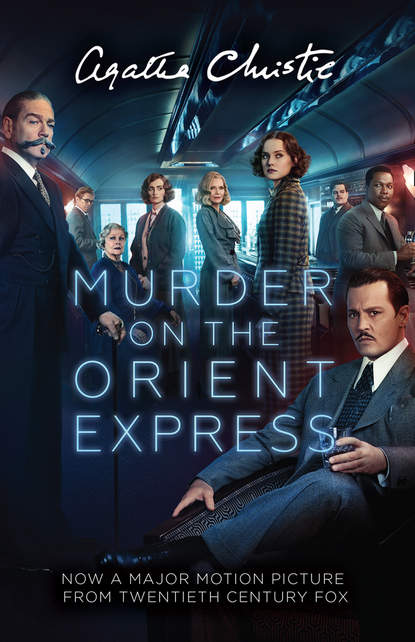По всем вопросам обращайтесь на: info@litportal.ru
(©) 2003-2025.
✖
Murder on the Orient Express
Автор
Год написания книги
2019
Настройки чтения
Размер шрифта
Высота строк
Поля
Doubtless M. Bouc saw a change in his friend’s expression.
‘It is at your wild animal you look?’ he asked.
Poirot nodded.
As his coffee was brought to him, M. Bouc rose to his feet. Having started before Poirot, he had finished some time ago.
‘I return to my compartment,’ he said. ‘Come along presently and converse with me.’
‘With pleasure.’
Poirot sipped his coffee and ordered a liqueur. The attendant was passing from table to table with his box of money, accepting payment for bills. The elderly American lady’s voice rose shrill and plaintive.
‘My daughter said, “Take a book of food tickets and you’ll have no trouble—no trouble at all.” Now, that isn’t so. Seems they have to have a ten per cent. tip, and then there’s that bottle of mineral water—and a queer sort of water too. They hadn’t got any Evian or Vichy, which seems queer to me.’
‘It is—they must—how you say—serve the water of the country,’ explained the sheep-faced lady.
‘Well, it seems queer to me.’ She looked distastefully at the heap of small change on the table in front of her. ‘Look at all this peculiar stuff he’s given me. Dinars or something. Just a lot of rubbish, it looks. My daughter said—’
Mary Debenham pushed back her chair and left with a slight bow to the other two. Colonel Arbuthnot got up and followed her. Gathering up her despised money, the American lady followed suit, followed by the lady like a sheep. The Hungarians had already departed. The restaurant-car was empty save for Poirot and Ratchett and MacQueen.
Ratchett spoke to his companion, who got up and left the car. Then he rose himself, but instead of following MacQueen he dropped unexpectedly into the seat opposite Poirot.
‘Can you oblige me with a light?’ he said. His voice was soft—faintly nasal. ‘My name is Ratchett.’
Poirot bowed slightly. He slipped his hand into his pocket and produced a matchbox which he handed to the other man, who took it but did not strike a light.
‘I think,’ he went on, ‘that I have the pleasure of speaking to M. Hercule Poirot. Is that so?’
Poirot bowed again.
‘You have been correctly informed, Monsieur.’
The detective was conscious of those strange shrewd eyes summing him up before the other spoke again.
‘In my country,’ he said, ‘we come to the point quickly. Mr Poirot, I want you to take on a job for me.’
Hercule Poirot’s eyebrows went up a trifle.
‘My clientèle, Monsieur, is limited nowadays. I undertake very few cases.’
‘Why, naturally, I understand that. But this, Mr Poirot, means big money.’ He repeated again in his soft, persuasive voice, ‘Big money.’
Hercule Poirot was silent a minute or two, then he said:
‘What is it you wish me to do for you, M.—er—Ratchett?’
‘Mr Poirot, I am a rich man—a very rich man. Men in that position have enemies. I have an enemy.’
‘Only one enemy?’
‘Just what do you mean by that question?’ asked Ratchett sharply.
‘Monsieur, in my experience when a man is in a position to have, as you say, enemies, then it does not usually resolve itself into one enemy only.’
Ratchett seemed relieved by Poirot’s answer. He said quickly:
‘Why, yes, I appreciate that point. Enemy or enemies—it doesn’t matter. What does matter is my safety.’
‘Safety?’
‘My life has been threatened, Mr Poirot. Now, I’m a man who can take pretty good care of himself.’ From the pocket of his coat his hand brought a small automatic into sight for a moment. He continued grimly. ‘I don’t think I’m the kind of man to be caught napping. But as I look at it I might as well make assurance doubly sure. I fancy you’re the man for my money, Mr Poirot. And remember—big money.’
Poirot looked at him thoughtfully for some minutes. His face was completely expressionless. The other could have had no clue as to what thoughts were passing in that mind.
‘I regret, Monsieur,’ he said at length. ‘I cannot oblige you.’
The other looked at him shrewdly.
‘Name your figure, then,’ he said.
Poirot shook his head.
‘You do not understand, Monsieur. I have been very fortunate in my profession. I have made enough money to satisfy both my needs and my caprices. I take now only such cases as—interest me.’
‘You’ve got a pretty good nerve,’ said Ratchett. ‘Will twenty thousand dollars tempt you?’
‘It will not.’
‘If you’re holding out for more, you won’t get it. I know what a thing’s worth to me.’
‘I also—M. Ratchett.’
‘What’s wrong with my proposition?’
Poirot rose.
‘If you will forgive me for being personal—I do not like your face, M. Ratchett,’ he said.
And with that he left the restaurant car.
Chapter 4 (#ulink_e404ada3-b8d9-56ca-bbe9-0f7f4eb59e35)
A Cry in the Night (#ulink_e404ada3-b8d9-56ca-bbe9-0f7f4eb59e35)
The Simplon Orient Express arrived at Belgrade at a quarter to nine that evening. It was not due to depart again until 9.15, so Poirot descended to the platform. He did not, however, remain there long. The cold was bitter and though the platform itself was protected, heavy snow was falling outside. He returned to his compartment. The conductor, who was on the platform stamping his feet and waving his arms to keep warm, spoke to him.
‘Your valises have been moved, Monsieur, to the compartment No. 1, the compartment of M. Bouc.’

















